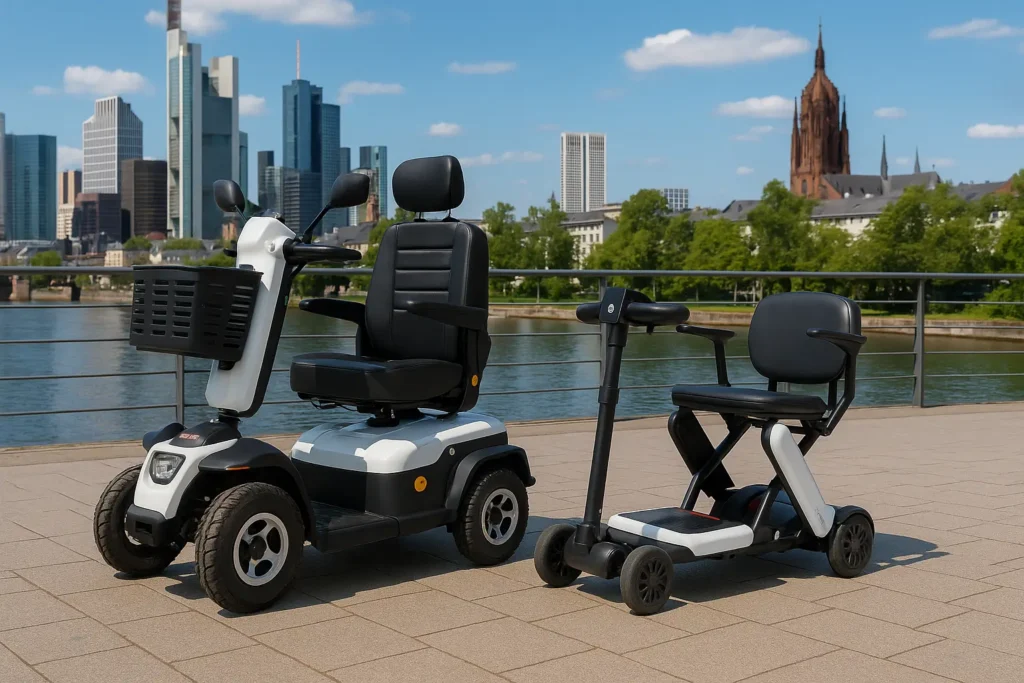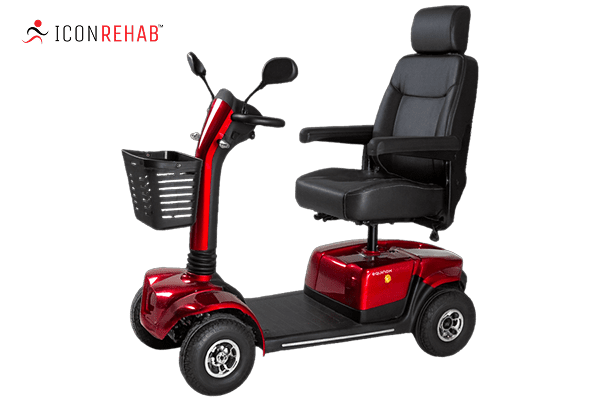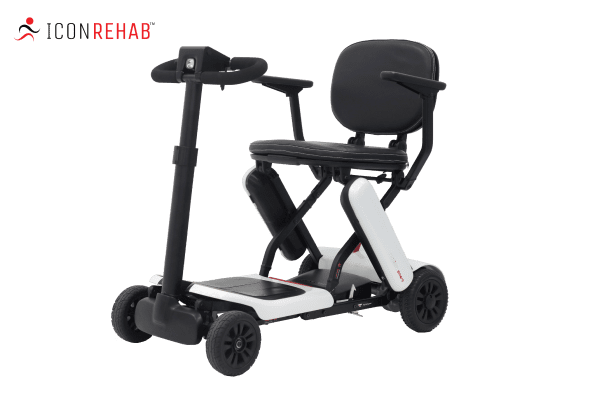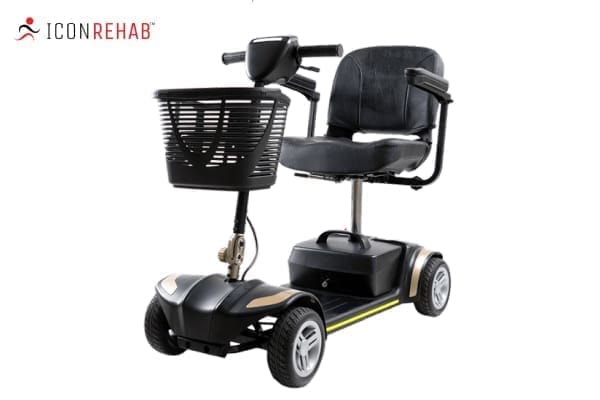Mobility Scooter Buyers’ Guide (2025 Edition)

Buying a mobility scooter is a big decision. For many people, it’s not just about getting from A to B — it’s about maintaining your independence, enjoying day-to-day life and staying connected with family and friends.
But with so many scooters on the market, from small folding ones to powerful heavy-duty models, it can be overwhelming to know where to start. That’s why we’ve put together this Mobility Scooter Buyers’ Guide (2025 Edition) — to make things simple, clear and practical.
We’ll talk about price ranges, the features that matter most and whether renting might make more sense than buying. By the end, you’ll know exactly what to look for and which type of scooter fits your lifestyle.
What Exactly Is a Mobility Scooter?
A mobility scooter is essentially a battery-powered vehicle designed to help you move around more easily if walking longer distances is difficult.
Unlike wheelchairs, mobility scooters have a comfortable seat, handlebars (similar to a bike) and rechargeable batteries. They’re used by all sorts of people: seniors, those recovering from injury or surgery, or anyone who needs extra support to stay mobile.
In the UK, there are two classes of scooters:
- Class 2: Smaller models that go up to 4mph, made for pavements and shopping centres.
- Class 3: Bigger scooters that can go up to 8mph and be driven on the road (with DVLA registration).
Explore our Full Range of Adapt A Home Mobility Scooters
- Max user weight 150 kg
- High-Quality Steel Frame
- Reclining comfort seat
- Intelligent & Sensitive Braking
- All-in-One Control Panel
Subject to status. Finance by PayItMonthly
- Max user weight 125 kg
- One Touch Folding
- Electromagnetic Brakes
- Power Saving Mode
- 3-Year Frame Warranty
Subject to status. Finance by PayItMonthly
- Max user weight 136 kg
- Dual 270W motors
- Electromagnetic brake
- 20Ah lithium-ion battery
- Swivel seat for easy access
Subject to status. Finance by PayItMonthly
- Max user weight of 210 kg
- Supportive & adjustable Pilot Seat
- Automotive style suspension
- 32 miles range
- Built-in speaker with Bluetooth
Subject to status. Finance by PayItMonthly
How Much Do Mobility Scooters Cost in 2025?
The price really depends on what you need the scooter for. Here’s a simple breakdown:
Entry-Level Scooters (£600 – £1,000)
- Small, lightweight and foldable.
- Perfect for short trips or indoor use.
- Battery life: about 8–15 miles.
- Weight capacity: up to 115 kg.
Best if you only use it occasionally, or need something that fits in the boot of your car.
Mid-Range Scooters (£1,000–£2,500)
- Sturdier and more comfortable than entry-level.
- Battery life: 15–25 miles.
- Weight capacity: up to 135–150 kg.
- Good for regular daily use, like popping into town, shopping locally or visiting friends.
Best for someone who wants more comfort and reliability day-to-day.
Premium Scooters (£2,500–£5,000+)
- Heavy-duty, long-range models built for countryside roads and tougher terrain.
- Battery life: 25–40 miles.
- Weight capacity: up to 200 kg.
- Adjustable seats, suspension, bigger tyres and often extras like lights.
Best if you need it every day, live in a more rural area, or want maximum comfort.
What Should You Look For When Buying a Scooter?
Here’s a checklist of the main things to think about:
Comfort
You’ll be spending time on your scooter, so comfort matters. Look for padded seats, adjustable armrests and suspension if you’ll be on rougher ground.
Portability
Will you need to fold it up and put it in the car? Compact scooters are designed for travel, while heavy-duty ones are better left at home or in the garage.
Battery Range
Ask yourself: how far do I really go on a typical day?
- Quick trips = 10–15 miles per charge.
- Regular outings = 15–25 miles.
- Long days out = 25–40 miles.
Weight Capacity
Scooters vary a lot here. Standard models handle up to 120–135 kg, while heavy-duty scooters can carry up to 200 kg. Always give yourself a bit of extra margin as you may want to carry shopping or other items.
Storage Space
If you live in a flat, a compact model might be more practical. Larger scooters ideally need a secure, dry storage space like a garage or outbuilding.
Budget
Don’t just think about the upfront price — batteries need replacing every 2–3 years and annual servicing (or 6-monthly) is wise.
Should You Buy or Rent a Mobility Scooter?
This is one of the most common questions we get asked.
Buying makes sense if you’re going to use the scooter every day, long-term. It’s a bigger investment up front, but you’ll save money over time.
Renting is perfect if you:
- Only need a scooter for a short time (holiday, recovery).
- Don’t want to deal with maintenance.
- Want flexibility without committing to one model.
At Adapt A Home, we offer both mobility scooter rentals and sales, so you can try before you commit.
What Are the Best Mobility Scooters in the UK?
The “best” scooter depends on what you need. Here’s a quick snapshot:
- Travel Scooters: Light, foldable, great for shopping or holidays.
- Pavement Scooters: Sturdier, designed for everyday local trips.
- All-Terrain Scooters: Heavier-duty, perfect for uneven pathways and longer rides.
FAQs About Buying Mobility Scooters
Do I need a licence to use a mobility scooter in the UK?
Can I take a scooter on buses and trains?
How long do the batteries last?
Is it better to buy new or second-hand?
Why Choose Adapt A Home?
At Adapt A Home, we know that choosing a scooter isn’t just about specs — it’s about your comfort, independence and lifestyle. That’s why we offer:
- A wide range of compact, mid-range and heavy-duty scooters.
- Free home demonstrations so you can test models before buying.
- Affordable finance options to allow you to spread the cost.
- Aftercare and servicing, so you’re never left on your own.
We don’t just sell scooters — we help people live life more freely.
Final Thoughts
If you need something light and easy to use for short trips, go compact. If you’re after comfort, range and outdoor performance, go heavy-duty. And if you’re not sure? Renting first is a great way to test what works for you.
Ready to find the right scooter? Browse our full range of Mobility Scooters today or get in touch to book a free home demonstration.




